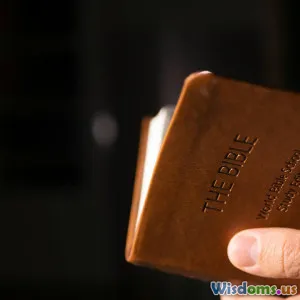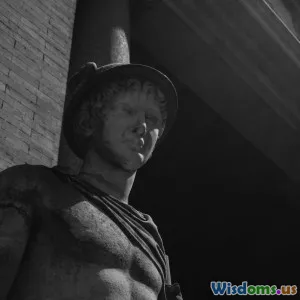
How Curiosity Drives Our Beliefs
8 min read Explore how innate curiosity shapes our beliefs in mysteries and the supernatural, revealing human psychology behind the unknown. (0 Reviews)
How Curiosity Drives Our Beliefs: Exploring Mysteries & The Supernatural
Introduction
Humans have always been captivated by the mysteries that lie beyond what we can see, hear, and measure. From ancient shamanistic rituals to modern-day ghost stories and supernatural legends, curiosity about the unknown is one of the most powerful forces shaping our beliefs. But why does curiosity drive us to hold convictions in things that often lack scientific proof? This article delves deeply into the psychology of curiosity and explores how this intrinsic human trait fuels our beliefs about mysteries and the supernatural.
Understanding this connection can illuminate the fascinating ways our minds bridge gaps in knowledge and assign meaning to the unexplained. As philosopher Albert Einstein once said, "The important thing is not to stop questioning. Curiosity has its own reason for existence."
The Psychological Roots of Curiosity
Curiosity is an innate cognitive drive that motivates exploration and learning. It is essential for survival, innovation, and cultural evolution. Neuroscientific studies reveal that curiosity activates reward circuits in the brain, releasing dopamine and generating a pleasurable anticipation for new information.
Curiosity as a Knowledge-Seeking Mechanism
When confronted with uncertainty or mystery, curiosity compels us to seek explanations. For example, when ancient civilizations witnessed thunderstorms, their inquisitive minds sought reasons, leading to mythologies about gods wielding thunderbolts. This early curiosity wasn’t simply about acquiring knowledge but also about reducing anxiety caused by the unknown.
The "information gap theory," proposed by psychologist George Loewenstein, suggests that when we detect a gap between what we know and what we want to know, curiosity is triggered. This heightened desire to fill the knowledge void becomes especially noticeable when it comes to supernatural claims, because they inherently involve unknown or anomalous events.
Curiosity's Role in Forming Beliefs in the Supernatural
The Search for Meaning in the Unexplained
Curiosity often pushes us to search for meaning where facts are missing or incomplete. Paranormal phenomena—such as ghost sightings, psychic abilities, or cryptid encounters—present puzzles that standard explanations fail to fully satisfy enthusiasts and even skeptics sometimes.
For instance, the Bermuda Triangle's enduring mystery has fascinated millions for decades despite numerous scientific efforts to demystify it. The human mind finds comfort in narratives that offer potential explanations, supernatural or otherwise. Curiosity fuels our engagement with these stories as we jot down clues, try to validate eyewitness accounts, and construct elaborate theories.
Cognitive Biases Reinforced by Curiosity
Curiosity doesn't operate in a vacuum — it intertwines with cognitive biases, impacting belief formation. For example, the "patternicity" or the tendency to see meaningful patterns in randomness drives us to perceive ghosts in shadows or find signs in coincidences.
Curiosity can intensify confirmation bias, where individuals favor information that supports pre-existing beliefs. When someone is deeply curious about a supernatural phenomenon—say, haunted locations—they might selectively seek evidence that aligns with that interest, preserving their belief system.
Social and Cultural Amplification
Communities sharing a curious interest in the supernatural reinforce beliefs through storytelling and collective experience. Cultural narratives imbue mysteries with symbols and rituals that satisfy curiosity in socially meaningful ways.
Consider how urban legends evolve with each retelling, passing down through generations. The story of La Llorona—a weeping spirit native to Latin American folklore—is a compelling example: fueled by curiosity and mystery, it shapes moral lessons while perpetuating supernatural belief.
Real-World Insights: Curiosity and Science in Paranormal Investigations
Professional paranormal investigators employ curiosity as a key driver. Their approach combines skepticism with an open mind; they explore phenomena without dismissing possibilities outright.
For example, the rise of scientific tools like EVP (Electronic Voice Phenomenon) recorders and thermal imaging cameras reflects a methodical curiosity to capture evidence. Whether the findings ultimately prove supernatural claims or debunk them, the investigative process illustrates how curiosity bridges mysticism and rational inquiry.
Interestingly, a 2018 study by the University of London tested paranormal claims with both believers and skeptics. It found curiosity was a shared trait, but the difference lied in the cognitive style: believers favored experiential, intuitive thinking, while skeptics relied more on analytical processes. This highlights that curiosity functions as a double-edged sword—it drives exploration into the unknown while allowing divergent belief paths.
Conclusion: Embracing Curiosity While Seeking Clarity
Curiosity is undeniably foundational in molding our beliefs, particularly about mysteries and the supernatural. It motivates us to explore beyond the boundaries of known reality and to construct narratives that provide comfort, meaning, or wonder. Across history and cultures, this inquisitive spirit has both advanced human knowledge and fostered enduring myths.
Recognizing how curiosity shapes our beliefs equips us with insight—enabling openness without naivety and imagination balanced by critical thought. As we navigate the terrain between wonder and skepticism, we can honor curiosity’s vital role: not just in accepting claims dogmatically but in pursuing understanding with humility.
Ultimately, whether unveiling cosmic secrets or hearing whispers in haunted corridors, the quest driven by curiosity enriches our human experience by keeping the unknown irresistibly alive.
References
- Loewenstein, G. (1994). The psychology of curiosity: A review and reinterpretation. Psychological Bulletin.
- Vyse, S. A. (2014). Believing in Magic: The Psychology of Superstition.
- Griffiths, R. R., Presti, D. E., & Johnson, M. W. (2018). Cognitive styles and paranormal belief: An online study.
- Poe, A. (2009). The Tell-Tale Heart and Other Tales. The Library of America.
Written by an AI content specialist committed to insightful explorations of human cognition and cultural phenomena.
Rate the Post
User Reviews
Popular Posts





















